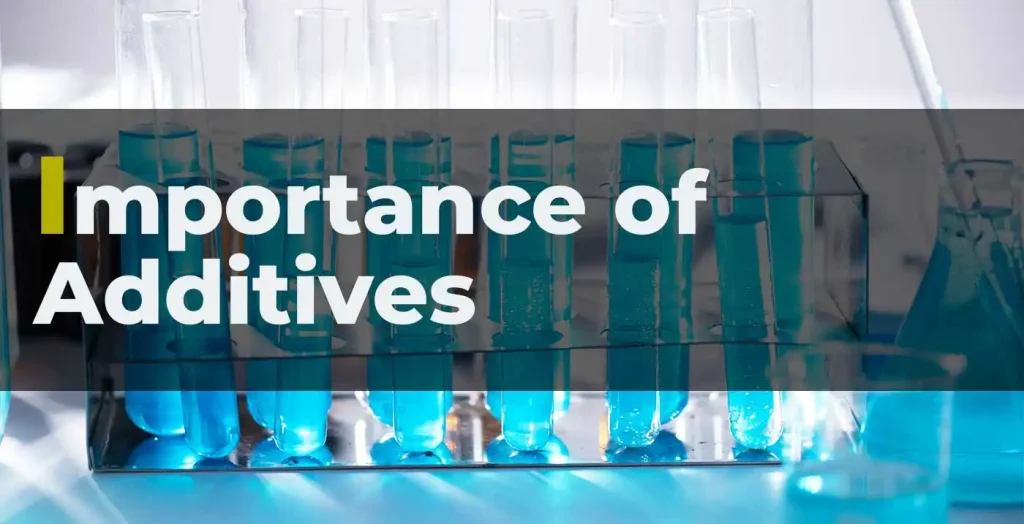
Today engine manufacturers are continuously involved in the research and development process and with the use of advanced technology and engineering helps them to develop light and heavy duty engines with high level features. So in order to meet the lubrication and other challenging requirements of such modern engines needs a powerful engine oil lubricants.
Traditional engine oils are normally considered as mono grade engine oils and which are not capable enough to satisfy the requirements of modern engines. So the engine oil lubricant manufacturers developed multigrade engine oils by using base oil with advanced additives which gives more features and characteristics to these engine oils and helps to satisfy the challenging requirements of ultra modern engines.
Additives are considered as chemical compounds used for formulating engine oils along with base oils to provide advanced features & characteristics and also to improve the overall performance of engine oil. That’s why these additives play a vital role in meeting the requirements of engines used for different types of applications.
The Presence of additives in engine oil lubricants plays an important role in ensuring proper lubrication and meeting the challenging requirements of modern combustion engines. According to today’s engine operating technology and structural components are highly advanced and if we use engine oils formulated without these additives on these engine can lead to bread downs, overheating, leakouts, damaging engine components due to improper lubrications etc.
Today engine oil manufacturers use different types of additives in formulating their engine oils, these additives are selected based on the application type and conditions where they used. Some of the commonly used additives used for formulating engine oils are Detergent Additives, Corrosion Inhibitors, Antioxidants Additives, Metal deactivators, Alkaline additives, Viscosity modifiers, Pour point depressants, Friction modifiers, Extreme pressure additives, Antiwear or wear-inhibiting additives, Dispersants, Anti-foam additives etc.
Detergent Additives
Detergent Additives are normally used in engine oils in order to keep the engine and its moving parts always clean. Basically detergent additives help to prevent the formation of deposits, contaminants and sludge within the engine, which will lead to proper lubrication and improve the fuel efficiency of the engine. Over a period of time engines start to deposit dirt, impurities, carbon and particle substances on the surfaces of its own components (pistons, valves, and cylinder walls, crankshaft) during their operation and these deposits will start to affect the lubrication and overall engine performance.
Detergent additives is considered as a cleaning agent used while formulating engine oil in order to prevent the particle deposit formation inside the engine, as a result the inside of the engine and its components always keep clean and which helps to ensure the engine runs smoothly and efficiently without any interruption due to damages and breakdowns.
Corrosion Inhibitors
Corrosion inhibitors are considered as other forms of additives used in engine oil lubricants in order to provide protection to the surface of the engine and its components from corrosion and rust. By formulating engine oil along with corrosion inhibitor additives helps to form a protective layer on the surface of the engine and it’s metallic moving parts and this will act as a barrier on the surface of these metal parts of the engine from direct contact with corrosive agents, moisture and water contaminants causing corrosion and rust. This protection layer not only protect the metallic surface from direct contact with corrosive elements but also prevent the chemical reactions that will lead to rust and corrosion.
Antioxidants Inhibitor Additives
Antioxidants inhibitors are commonly used additives in engine oil lubricants in order to prevent the degradation of oil from oxidation. Oxidation in engine oil is a natural chemical process that occurs when engine oil is exposed to oxygen and other contaminants present in the atmosphere. Normally oxidation affects the engine oil lubricants when it used in high temperature and high pressure conditions along with exposure to oxygen, which will initiate the oxidation process and it starts to affect the engine oil breakdowns and alter properties (such as change in viscosity, flash points, temperature stability etc) and also form sludge and deposits along with degradation of engine oil.
Metal Deactivator Additives
Metal deactivators are other forms of additives commonly used while formulating engine oil lubricants in order to protect the metal surfaces of an engine and it’s moving components from the harmful effects of other metal particles that can cause oxidation and degradation. Some of the common hazardous metal contaminants are copper, iron, etc, they are commonly known as catalytic metals normally found in engine components and in fuel or air. If these catalytic metal come in contact with engine oil it will increase the speed of oxidation process and it leads to fast degradation of engine oil and which further increases the frequency of oil change.
Alkaline additives
Alkaline additives are normally used in engine oils to neutralize the acids formed during the combustion process otherwise these acids will start to degrade metal surfaces of the engine components and lead to engine damage and sudden breakdowns. Alkaline additives in engine oil will resist the acid formation by raising the PH level of engine oil and thereby protect the engine components and its surfaces from acid chemical degradations.
Pour Point Depressants
Pour Points Depressants are another set of additives used in engine oil inorder to improve it’s fluidity in cold weather conditions. Earlier engine oils formulated with single viscosity grades are needed to face such cold weather issues, because during cold weather this kind of monograde engine oils start to freeze and change it’s liquid structure to a solid structure which will affect the lubrication process and damage the engine components especially during cold engine startups. So lubricant manufacturing companies started to use pour point depressants in their engine oils in order to maintain the oils fluidity even under extreme cold weather conditions.
Pour point depressants work by altering the crystal formation of waxy components present in the oil. In colder temperatures, these waxy compounds tend to crystallize, causing the oil to solidify and limiting its flow. Pour point depressants interfere with the formation and growth of these wax crystals, preventing them from clustering together and solidifying the oil.
Friction Modifiers
Friction modifiers are another additive used frequently in engine oil formulation in order to reduce the friction between moving components of an engine. Friction modifier additives help the engine oil lubricants to form a thin layer on the surface of the moving parts of the engine and helps to reduce the friction whenever these parts come in contact. This reduction in friction helps to minimize the energy loss and enhance the fuel efficiency and reduce the wear & tear significantly.
Friction Modifiers normally form a protective layer on the surface of the engine components so that it helps to generate a space or gap between these components whenever they come in contact through sliding or rolling over and which will reduce the metal to metal contact thereby reducing the friction between the moving parts of an engine.
Extreme Pressure Additives
Extreme Pressure Additives are almost similar to antiwear additives, extreme pressure additives are normally used in engine oil to reduce the friction between engine components during high pressure conditions. Antiwear additives are used to reduce friction under normal operating temperature and pressure situations. Engine oils formulated with extreme pressure additive agents are highly used in engines operating under extreme workload and pressure situations where frequent metal to metal contact and friction is high, so extreme pressure additives will form protective layer on the surface of the engine components and reduce the friction generated between the engine components and thereby prevents the energy loss and reduce the wear and tear.
Anti-Foam Additives
Antifoam additives are another commonly used additive in engine oils in order to prevent foam formation. During the engine operation process, especially in high-performance or high-speed conditions, engine oil lubricants can experience agitation or turbulence that causes the creation of foam or bubbles within the oil. Formation of excessive foam in engine oil can lead to affect the proper lubrication and which will lead to affect the total performance of the engine. Foam in engine oil also leads to the formation of sludge and deposits over a period of time which can damage the engine components and further lead to sudden engine breakdown.
Antiwear Additives
Antiwear additives are commonly used additives in engine oil in order to reduce the wear and tear of engine parts. Antiwear additives help the engine oil to form a protective layer or barrier on the surface of engine components to reduce the friction and thereby helps to reduce wear and tear. By forming protective film on the surface of engine components (like Crankshaft, Connecting rod, Piston, Engine block, Piston ring, Timing belt, Combustion chamber and Cylinder) helps to reduce the direct contact between these metal parts and which will contributes to the reduction in friction and wear & tear and thereby reduces the damage and enhance the engine life span.
Viscosity Index Improvers or Viscosity Modifiers
Viscosity index improvers also known as viscosity modifiers, from it’s name itself easy to understand the primary use of this chemical compound. Viscosity modifier additives are basically polymers, which will alter it’s chemical properties and structure under changing temperature conditions. That means when engine oil combines with viscosity modifying polymer, during cold temperature oil start to cool then the polymer starts contracting and making the oil thinning and allowing the oil to flow smoothly. On the other hand, during high temperature polymer starts to expand and thicken the oil and prevent it from thinning and thereby ensuring efficient lubrication. Viscosity modifying additives are commonly used in multigrade engine oils in order to improve and maintain viscosity in accordance with changing temperature conditions. In the past engine oil are formulated with single viscosity grades like SAE 40, SAE 90, SAE 50 these oils are also knowns as mono grade engine oils, so due to single grade viscosity these oil has to face challenges in maintaining it’s thickness because during high temperature and pressure conditions mono grade engine oils will loss it’s viscosity or thickness and it will affect the lubrication similarly in low temperature these oil need to maintain low viscosity or two flow freely but due to monograde characteristics it’s difficult to achieve such fluidity. So due to these difficulties lubricants manufacturers in UAE developed multigrade engine oils (such as 20W50, 10W30, 10W40, 15W40 etc) with dual viscosity grades by using Viscosity modifier additives. Multigrade engine oils formulated with viscosity modifiers help the oil to change it’s viscosity in accordance with changing temperature conditions, which means oil has high viscosity during hot temperature and low viscosity in cold weather conditions. So having dual viscosity characteristics helps the engine oil to ensure proper lubrication inside the engine even under changing temperature conditions and which will give stable performance and increase the engine longevity. This is the reason viscosity modifier additives plays a vital role in ensuring the optimum level of lubrication inside the engine under varying temperature conditions.
Seal Conditioner
Seal conditioners are another form of additives used in engine oil lubricants to maintain integrity, strength and watertightness of seal and gaskets of an engine. Over a period of time engine seals and gaskets will lose it’s tightness and can leads to leaks due to frequent exposure to high temperature, pressure and workload conditions. So by using seal conditioner additives in engine oil will prevent such leaking incidents by maintaining the strength and integrity of engine seals and gaskets even under extreme temperature and pressure situations.
As a conclusion, Today additives are one of the most important elements in engine oil formulation to overcome the challenging conditions and situations . The various forms of additives help the engine oils to maintain and enhance the quality and performance and also protect it from degradation due to various harmful effects such as foam formation, oxidation etc. On the other hand, these additives protect the engine from various hazardous effects such as corrosion and rust, wear and tear of engine components, engine oil leakages etc and always keeps the engine clean all these will lead to improved the engine performance and increase the engine lifespan. So the regular use of high-quality lubricants with appropriate additives is a fundamental aspect of engine maintenance and can significantly impact the reliability and performance of machinery in the long run.


